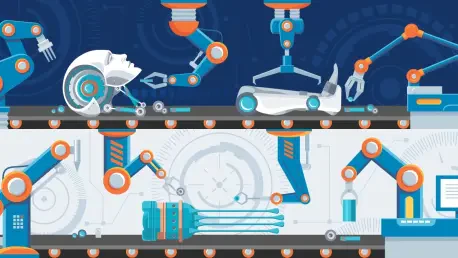In an era where technological leaps are a critical metric of progress, AI-driven manufacturing solutions have emerged as a pivotal force. The adoption of artificial intelligence in manufacturing is not merely a phenomenon; it is a revolution reshaping industries worldwide. With its potential to optimize production capabilities, enhance efficiency, and ensure quality, AI is becoming a cornerstone of modern manufacturing. This analysis delves into how AI is transforming the manufacturing landscape, supported by current trends, expert insights, and potential future developments.
Current Landscape of AI in Manufacturing
Data and Trends in AI Adoption
The integration of AI within the manufacturing industry has shown an impressive upward trajectory, reflecting its growing importance and acceptance. Recent statistics reveal that AI adoption in manufacturing has increased substantially. Reports indicate that nearly half of the manufacturers worldwide are employing AI-driven solutions to enhance their operational capabilities. The increasing reliance on AI is attributed to its ability to provide real-time data analysis, predictive maintenance, and process automation, leading to improved productivity and cost-effectiveness.
The influence of AI in manufacturing is not restricted to large corporations alone; small and medium enterprises are also making strides in AI adoption. The global manufacturing sector has witnessed a significant rise in the acquisition of AI technologies, driven by a need to stay competitive in an evolving market. This adoption trend is powered by access to large datasets and advanced analytics, fueling innovation and efficiency in manufacturing processes.
Real-World Applications and Innovations
Among the companies at the forefront of applying AI solutions is CloEE, an innovative platform that leverages machine insights to transform manufacturing. Following a successful funding round, CloEE secured $600K in pre-seed funding, marking a new era of expansion. This development enables the company to integrate with manufacturing systems and deliver real-time insights that enhance efficiency and product quality. With operations spanning the Nordics, Italy, and the United States, CloEE exemplifies the tangible benefits AI provides in manufacturing.
The innovation does not stop there. CloEE’s collaborations with renowned industry leaders, such as Hyundai, showcase the potential of AI in redefining manufacturing processes. By engaging with over 25,000 machines worldwide, the platform generates reports that optimize resource utilization and energy consumption. These applications portray only a fragment of the transformative power of AI in the industrial sector, highlighting its capacity to drive revenue growth and operational excellence.
Expert Insights on AI Manufacturing Solutions
Industry experts consistently underscore the transformative potential of AI in manufacturing while addressing pertinent challenges. The consensus among leaders is that AI technologies not only enhance efficiency but also drive sustainable manufacturing practices. By automating routine processes, AI allows for streamlined operations and reduced human error, achieving unprecedented precision in production.
Nevertheless, there are challenges in fully realizing AI’s potential in manufacturing. Experts emphasize the importance of data security and effective integration with existing systems as critical hurdles. Overcoming these challenges requires robust infrastructure and strategic alignment, ensuring that AI technologies blend seamlessly with established manufacturing processes. Despite these obstacles, the impact of AI on manufacturing is profound, extending beyond innovation to foster a future-ready industrial ecosystem.
Future Prospects of AI in Manufacturing
As the manufacturing industry continues to evolve, AI stands ready to spearhead future advancements. Technological developments on the horizon include more sophisticated machine learning algorithms and enhanced data analytics that promise to drive further efficiencies and process innovations. These advancements will propel manufacturing into new realms of capability, enabling real-time decision-making and predictive analysis on a scale previously unattainable.
With AI’s potential benefits come challenges that manufacturing must navigate. Companies will need to address the skills gap in the workforce and invest in training programs to prepare their employees for AI-centric workplaces. Additionally, ethical and regulatory considerations will shape how AI is integrated into manufacturing policies, ensuring its applications adhere to industry standards and societal values.
Predicting the trajectory of AI-driven manufacturing, firms are likely to experience both transformational benefits and new challenges. While the technology promises enhanced productivity, its integration must be managed thoughtfully to mitigate potential impacts on employment and societal structures. Ultimately, AI holds the power to redefine manufacturing, bringing profound efficiencies while demanding careful adaptation.
Conclusion and Takeaways
Reflecting on the key points discussed, AI-driven solutions are pivotal in reshaping the manufacturing industry and fostering growth. The technology’s ongoing development promises continued innovation, driving efficiencies and competitive advantage for manufacturing firms. This analysis highlights the critical role AI plays in advancing industrial processes and highlights the importance of integrating AI technologies.
Industry leaders must remain vigilant, continuously observing AI’s progress to harness its full potential. By doing so, they will position their companies to capitalize on AI-driven opportunities and contribute to a sustainable, forward-thinking manufacturing landscape. A proactive approach will ensure that as this trend continues to evolve, businesses are prepared to adapt and thrive in the dynamic world of AI-powered manufacturing.









